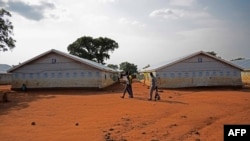Officials in northern Uganda say dozens of cholera cases have been reported at a reception center for South Sudanese refugees. Cholera is an infectious disease usually spread through contaminated water that causes severe diarrhea and dehydration. Left untreated it can lead to death. Health officials are using cholera kits and increasing screenings to try to stop the spread of the disease. But between overcrowding and ongoing heavy rains, this could prove challenging.
Over the weekend, officials confirmed that 45 cases of cholera were discovered in the Pagirinya refugee reception center in northern Uganda. Although officials say most have been quarantined and treated, it comes at a time when resources are already strained and overcrowding in refugee settlements is a massive concern.
Over 80,000 South Sudanese refugees have come to Uganda since fighting erupted in Juba last month. Pagirinya holds nearly 28,000 refugees, well above its capacity.
Irene Nakasiita with the Ugandan Red Cross says the outbreak did not take them by surprise.
“We expected it actually, we have always expressed fear," Nakasiita said. "Especially when the weather changed. We already anticipated it and put up measures in place. So as much as it has broken out at least it's being managed. And if we weren't prepared probably the numbers would have been higher and maybe some people would have even have died already.”
The Ugandan National Meteorological Authority has predicted above average rainfall in northern areas of the country until the end of August. This has stoked fears of water-borne illnesses continuing to spread.
The Ugandan Red Cross says incoming arrivals are all being screened for cholera before being sent to Bidi Bidi, a new refugee settlement able to house around 100,000 new arrivals. In addition, increased testing of water sites, door-to-door cholera education campaigns and monitoring of symptoms has been stepped up.
However, budget shortfalls continue to be a problem. According to relief group the Norwegian Refugee Council, aid groups have only received 20 percent of the funds needed to adequately care for new arrivals.
Tuesday, the Ugandan prime minister’s office, the U.N. World Food Program and the U.N. refugee agency UNHCR announced that due to a lack of funds, food rations would be cut.
“We're now starting to see already the reality of that impact with the report yesterday from ourselves, OPM and WFP that refugees who came before July 15 will have their food rations revised by 50 percent," said Charlie Yaxley of the UNHCR. "We hope it's a temporary measure and the international community will speed up their contributions to the humanitarian response so we can restore these food rations as soon as possible.”
And there are indications fighting in South Sudan will continue.
“The refugees arriving from Central Equatoria are telling us that there's intense fighting taking place in a number of towns across Central Equatoria and that armed militias have been distributing letters across towns and villages warning people to leave the area and heavy fighting is to be expected in the days and weeks ahead,” Yaxley said.
UNHCR is deploying more staff in the area in case the influx from South Sudan continues. However, without increased assistance, they say it will be difficult to provide even the bare essentials to incoming refugees.




